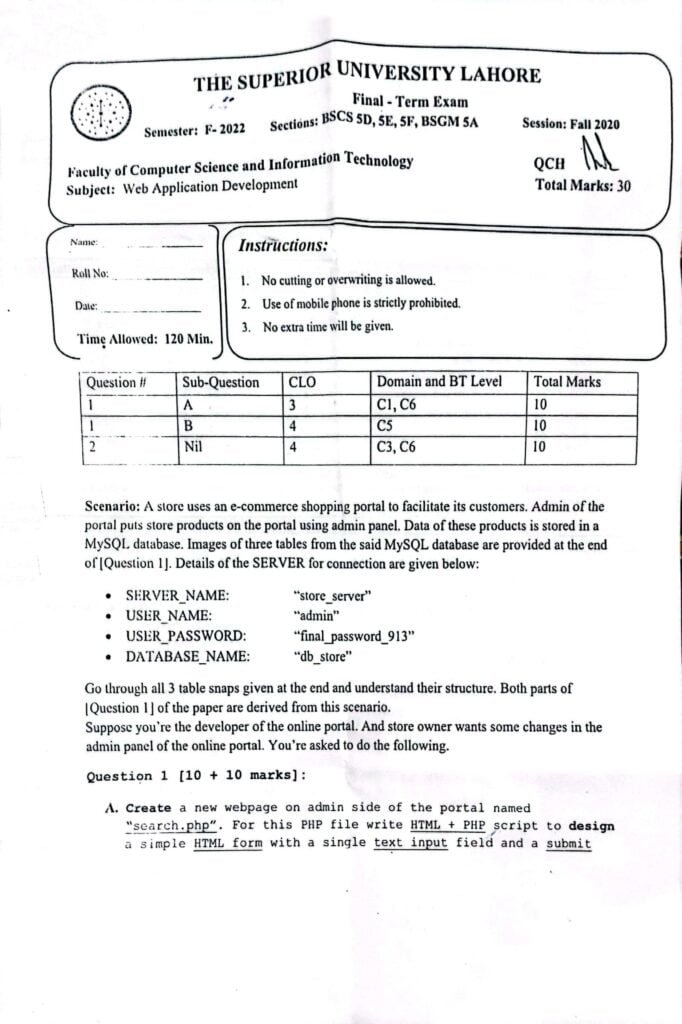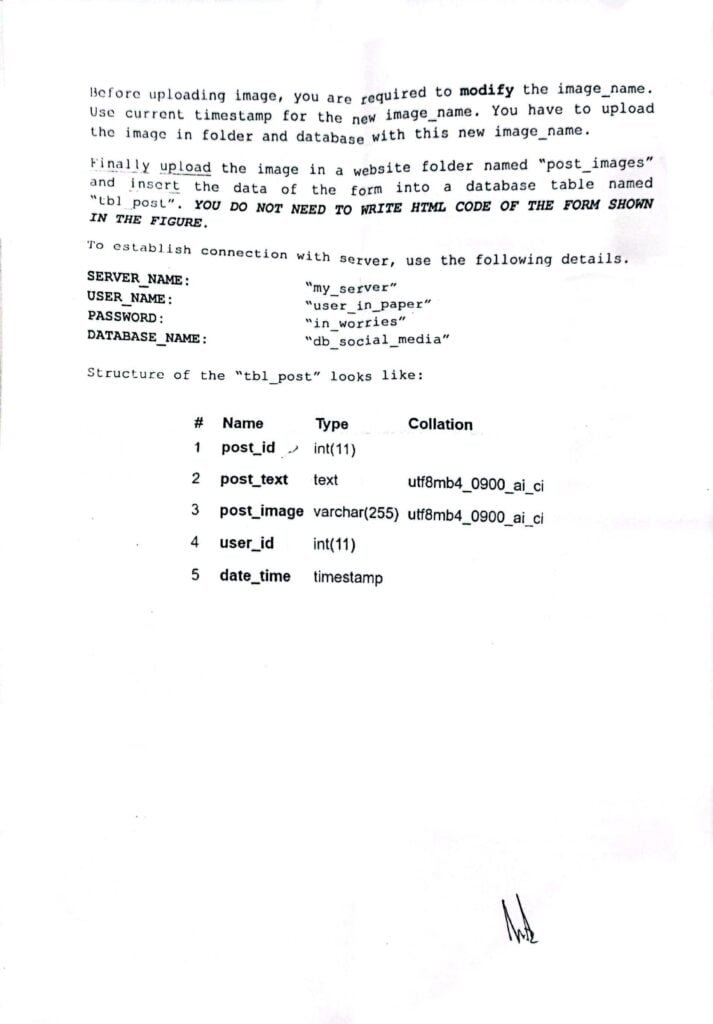Web Application Development | Final Term Past Paper | Superior University | VU Exam Guide

Table of Contents
Unlocking the Power of Web Application Development: Your Gateway to the Future
Are you prepared to take a step into the Web Application Development world? This course is perfect for you if you’re interested in creating dynamic, interactive web experiences and find the complexities of the digital world fascinating. We’ll go over the ins and outs of Web Application Development in this blog article, covering everything from what to learn to the plethora of chances that await you once you’ve finished.
Introduction to Web Application Development
The building of strong, intuitive internet-based apps is the fundamental focus of web application development. Programming languages, frameworks, and design ideas are used by developers to create apps that can handle a wide range of functions, from basic form submission to intricate data processing.
What You’ll Learn
Upon completing this subject, you’ll gain proficiency in a variety of essential skills, including:
- Programming Languages: Proficiency in programming languages, including HTML, CSS, JavaScript, and backend languages like PHP, Python, or Ruby, is required.
- Frameworks and Libraries: React, Angular, and Vue.js are examples of frameworks that can be used to improve functionality and expedite development processes.
- Database Management: is the knowledge of storing and retrieving data using database systems such as MySQL, PostgreSQL, or MongoDB.
- Server-Side Development: Using languages like Django or Node.js for server-side programming to manage backend tasks.
- Security Practices: Best practices for protecting web applications from online attacks and vulnerabilities are known as security practices.
Importance of Web Application Development
Nowadays, with everything becoming digitized, web apps are essential to almost every part of our life. Web apps have become the backbone of our connected world, appearing in everything from social media networks to e-commerce platforms, online banking to educational portals. Gaining expertise in Web Application Development gives you the ability to influence digital innovation going forward and opens you a world of prospects.
Real-Time Usage
Web application development has almost infinite applications. This technology powers a plethora of well-known platforms and applications that provide flawless customer experiences. Web apps are what power current digital ecosystems, from the widely used Google Apps to the social networking giant Facebook, and from e-commerce giants like Amazon to productivity suites like Microsoft Office 365.
Job Opportunities
There is a constant need for qualified web developers, and both well-established businesses and cutting-edge startups are offering a wide range of professional options. The varied employment opportunities that await graduates of this discipline include roles like Web Developer, Full-Stack Developer, Frontend Developer, Backend Developer, and UI/UX Designer, to name just a few.
Languages used in Web Application Development
Certainly! Here are some of the programming languages commonly used in Web Application Development:
- HTML (HyperText Markup Language): The backbone of web development, used for structuring and presenting content on web pages.
- CSS (Cascading Style Sheets): Used for styling and formatting HTML elements, enhancing the visual presentation of web pages.
- JavaScript: A versatile scripting language used for adding interactivity, dynamic behavior, and functionality to web pages.
- Python: Known for its simplicity and readability, Python is often used for backend development, data processing, and server-side scripting.
- PHP (Hypertext Preprocessor): A server-side scripting language used for developing dynamic web applications and interacting with databases.
- Ruby: Renowned for its elegant syntax and developer-friendly nature, Ruby is often used with the Ruby on Rails framework for rapid web application development.
- Java: A widely-used programming language, particularly in enterprise-level web development, offering scalability, performance, and cross-platform compatibility.
- C# (C-Sharp): Developed by Microsoft, C# is commonly used for building web applications on the .NET framework, offering robustness and scalability.
- Node.js: Although technically not a language but a runtime environment, Node.js allows developers to use JavaScript for server-side scripting, enabling full-stack JavaScript development.
- SQL (Structured Query Language): Essential for database management, SQL is used for storing, retrieving, and managing data in relational database management systems (RDBMS).
These languages, along with various frameworks, libraries, and tools, form the foundation of Web Application Development, empowering developers to create dynamic, interactive, and feature-rich web experiences.
Achievements on a Big Level
Once you’ve mastered web application development, you’ll be equipped with the knowledge and abilities to take on challenging projects and promote innovation in the digital space. The opportunities are unlimited, whether you’re developing cutting-edge software, starting a business, or working on open-source initiatives.
Benefits of Web Application Development
There are numerous advantages to learning web application development. You will not only gain in-demand, highly sought-after abilities, but you will also have the chance to use your innovations to actually change the world. Furthermore, the flexibility and independence that come with working remotely and collaborating with colleagues around the world are unmatched.
Current and Future Market Value
Proficiency in Web Application Development is highly valuable in the present economy. Professional developers will be in more demand as companies move more and more to digital solutions and online platforms. Web application development has a bright future ahead of it, thanks to the emergence of cutting-edge technologies like blockchain, AI, and IoT. This will only increase its importance in the digital economy.
FAQ’s
Q: Is prior programming experience required to excel in this subject?
A: While prior experience can be beneficial, this subject is designed to accommodate students with varying levels of programming knowledge, from beginners to advanced learners.
Q: What tools and software will I need for this course?
A: Basic text editors, web browsers, and development environments such as Visual Studio Code or Atom are commonly used. Additionally, familiarity with version control systems like Git is advantageous.
Q: How can I prepare effectively for exams in this subject?
A: Practice coding regularly, review lecture materials, work on assignments and projects, and seek clarification on any concepts or topics you find challenging.
Exam Point of View
You should anticipate a mix of academic questions, real-world coding exercises, and problem-solving scenarios in the final semester test. Learn about important ideas, programming paradigms, and algorithms. Also, don’t forget to check over previous papers to gain understanding of question styles and patterns.
Final Term Past Paper
Exam structure and question kinds can be observed by looking through previous “Design and Analysis of Algorithms” exams. This can help you better prepare for your final term assessment by giving you important insights into the kinds of questions that might be asked.




Note: You can also checkout all Subject Final Term Past Papers of your Superior University.
Conclusion
To sum up, web application development is more than simply a subject; it’s a doorway to limitless creativity and opportunity. Gaining proficiency in the knowledge and abilities covered in this course will improve both your professional and personal chances in the rapidly changing field of digital innovation. Are you prepared to take off on this thrilling adventure into the field of web development? The future is here; grasp it by both hands!
 Virtual University
Virtual University
 Superior university
Superior university